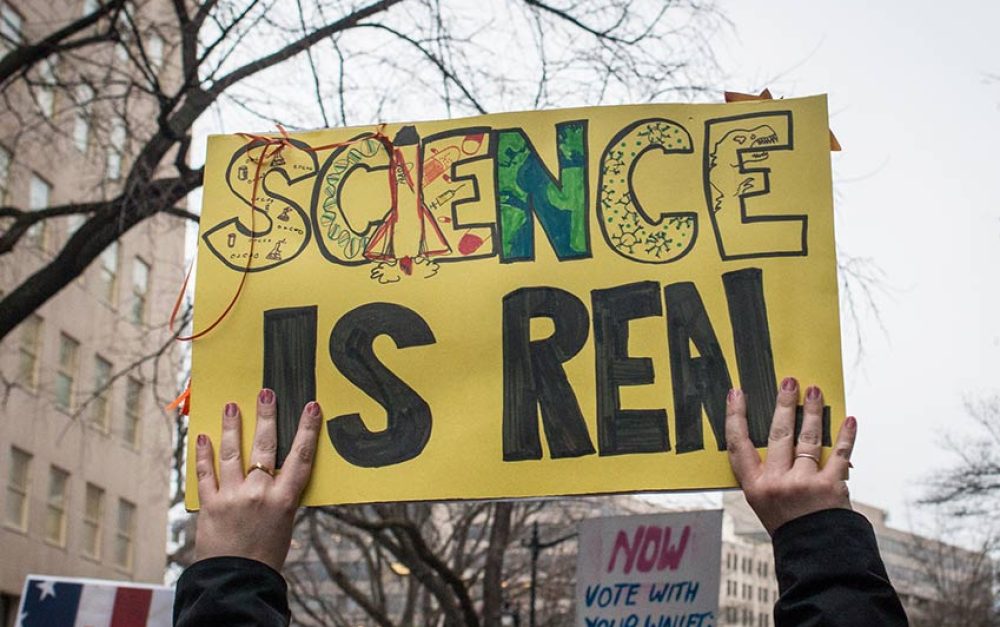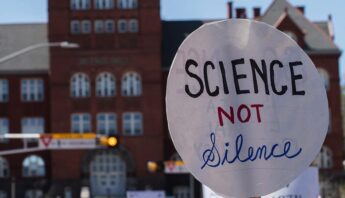Lately scientific evidence seems to matter a lot less than it used to. It’s not that evidence hasn’t been ignored by policymakers in the past. But there are some unique things happening under the new administration that seem to directly and fundamentally challenge the value of science. Across the country, scientists are responding by standing up and speaking out.
Lately scientific evidence seems to matter a lot less than it used to. It’s not that evidence hasn’t been ignored by policymakers in the past. But there are some unique things happening under the new administration that seem to directly and fundamentally challenge the value of science. Across the country, scientists are responding by standing up and speaking out.
Years ago, my roommate shared something his advisor had told him: “Science can only be done in a truly wealthy society.” At the time I thought his comment was solely about funding. But I’ve come to believe that “wealth” means more than financial resources. Wealth also means the conditions under which science thrives. It means the freedom to pursue basic research — and the freedom to invite and collaborate with scientists from all over the world.
So is science political? I think the answer is both yes and no. No, because pursuing questions to learn more about how things work isn’t necessarily a political act on its own. But also yes, because we can’t dismiss the social context in which scientific research takes place.
There are tragic examples of how this can play out, such as the Tuskegee syphilis experiments that were finally shut down after public outcry, or government policies based on eugenics. These shameful incidents were perpetrated by racism and prejudice, and allowed to continue unchecked because of the political climate at the time.
And examples like this are not wholly a thing of the past. Such incidents are an important reminder that certain government actions, supposedly taken for the public good, can occur at the expense of others.
Why science matters
Scientific evidence contributes to creating good public policy, and is key to our advocacy work here at PAN.
We rely on scientific studies to point out the health impacts of pesticides on vulnerable frontline groups, such as farmworkers, children and families in rural communities exposed to pesticide drift. PAN also collects original scientific data with community partners, using the Drift Catcher monitoring tool. These data support the anecdotal information we gather from talking to people in frontline communities — that pesticide drift affects people’s health and livelihoods, and that drift happens.
Data from studies on the science of ecologically-based farming and agroecology help PAN highlight flawed assumptions, such as the myth perpetuated by the pesticide industry that we need pesticides to feed the world.
Here’s one recent example of evidence-based policy action taken by the Environmental Protection Agency (EPA) to protect public health. The neurotoxic pesticide chlorpyrifos, once used for indoor pesticide applications, has been linked to adverse effects on children’s brain development. Based on the weight of the evidence from researchers across the country — from Columbia University, UC Davis, UC Berkeley and more — EPA finally proposed a ban of agricultural uses of chlorpyrifos.
While legal action from PAN and our partners helped drive this health-protective decision (which unfortunately is now at risk of being rolled back), in the end EPA action was based on strong, scientific evidence showing that dietary exposures would exceed target risk levels for children.
There oughta be a law… against anti-science laws
Which brings me to the worrisome anti-science measures now moving forward in Congress.
Here’s the backstory on a bill that keeps getting introduced, the “Secret Science Reform Act.” One tactic industry groups have used to undermine proposed EPA air pollution regulations has been to complain that the data the agency was using to make policy decisions were not publicly available. In reality, these data are “secret” because researchers are reluctant to share information specific to individuals due to ethical considerations — these data are from health studies, and participants expect that their data will remain confidential.
In a compromise measure in the air pollution case, the researchers allowed data to be reviewed by two independent teams of researchers to confirm their findings.
But this isn’t enough for industry groups, and lawmakers are now pushing the Secret Science Reform Act, a measure that would hobble EPA. The misleadingly-named bill would prevent EPA from making rules unless all of the data used for the rule were made publicly available. Industry data, however, is exempt from this requirement — under the premise that confidential business information might be revealed.
The issue here has to do with confidentiality of public health data, as in the air pollution example I described above. Because of confidentiality issues, this act will likely make it more difficult for public health studies to be used in rulemaking. There are two other bills in motion that would affect our government agencies’ evidence-based decisionmaking process; you can read more about them here.
Scientists stand up
Last Sunday, hundreds of people gathered in Copley Square in Boston for a Stand Up for Science rally, with many attendees of the American Association for the Advancement of Science (AAAS) meeting walking across the street to join the rally. On Earth Day April 22nd, scientists and non-scientists will be participating in the March for Science to show their support for science and evidence-based policy.
Will scientists be seen as less credible because they have a political point of view?
The fact is, scientists are part of society. It’s becoming increasingly difficult for science to benefit society — at least in the way I hoped for when I began studying science. It’s become harder for facts to win over ideology, especially as corporations — with financial interests at stake — are shaping the politics that shape the science.
All of us (including scientists) have to think about what kind of world we want to live in, including the kind of research we want to pursue — and that’s going to mean taking some measure of political action.
Photo: Liz Lemon | Flickr








